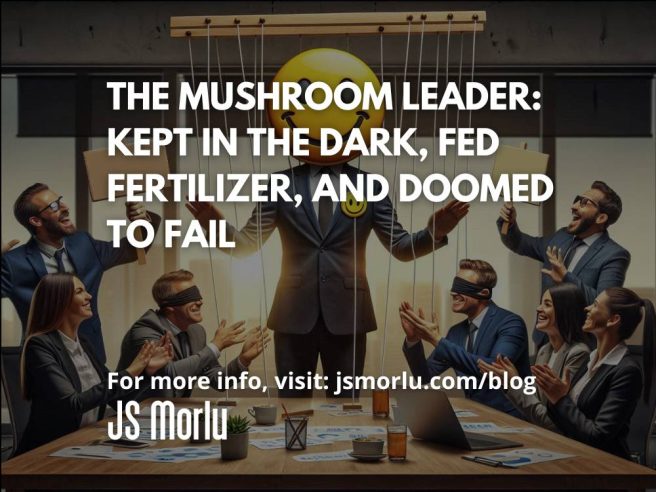By: John S. Morlu II, CPA
Let’s be brutally honest: most leaders don’t fail because of competitors, markets, or fate. They fail because their own people treat them like mushrooms — kept in the dark and fed fertilizer. Or in modern corporate terms: CC’d on the wrong email thread, left out of the “real” Slack channel, and given a sanitized PowerPoint that hides the dumpster fire raging behind the scenes.
Rule #1: Zero Manipulation
Manipulation is the cancer of leadership. The moment your subordinates start pulling strings, nudging narratives, or doing the “yes boss” routine while secretly saying “no boss” with their actions, your empire is already on fire — you just don’t smell the smoke yet.
Fun fact: Napoleon’s downfall didn’t just come from Waterloo. It started way earlier when his marshals stopped telling him the truth about the limits of his supply lines. They massaged his ego with “Yes sire, we can march through Russia” while privately stocking up on wool coats for themselves. We know how that ended: soldiers eating their horses in the snow. That’s manipulation in uniform.
Corporate version? Enron. Executives kept manipulating financial data, spinning fairy tales to investors while employees nodded along. On paper: profits. In reality: paper flames. Poof — $74 billion evaporated. Why? Because manipulation is a seductive lie that delays reality until it explodes.
Office version? Your team promising, “We’ll hit the deadline, no problem,” while secretly running a Google Doc titled ‘Reasons We’re All Going to Miss This Deadline and Blame IT.’ Manipulation today doesn’t always look like cooking books; sometimes it’s just cooking excuses in Slack DMs.
Tech company edition? WeWork. Adam Neumann convinced investors he was selling “community,” when in reality he was subletting office space with free beer taps. Manipulation dressed up as vision. The valuation hit $47 billion before collapsing faster than a foosball table in a startup break room.
Why people manipulate:
- Job protection. Employees think, “If the boss knows the truth, I’m fired.” So they massage numbers, dress up failures as wins, and spin half-truths to look indispensable.
- Turf defense. Department heads hoard their influence, fearing transparency will show they’re redundant.
- Ego. Some would rather bend reality than admit they were wrong.
- Fear of conflict. It’s easier to manipulate a narrative than face the boss’s anger head-on.
Manipulation, in short, is usually survival theater. The irony? It ends up being career suicide in slow motion.
Rule #2: Zero Withholding of Information
The second sin is silence. Withholding is the lazy cousin of manipulation. It doesn’t lie directly; it just leaves out the critical bit that would have changed everything.
Picture this: you’re the captain of the Titanic. Your crew notices the iceberg two hours before impact but doesn’t want to “disturb” you during dinner. Result? Frozen history. Withholding information is like handing your leader a steering wheel that’s not connected to the wheels. Looks good, but try turning it — nothing happens.
Real-world edition: U.S. intelligence before 9/11. Multiple agencies had puzzle pieces but didn’t share them. Withholding data meant no one saw the full picture until it was too late. That failure cost thousands of lives.
In the workplace, withholding may look smaller than manipulation, but it’s just as poisonous — in fact, it’s the silent killer. Subordinates see revenue numbers dipping but hide it “until next quarter.” They notice the project is off-track but keep quiet “because the boss looks stressed.” News flash: if your leader finds out too late, you’re not protecting them — you’re sabotaging them. You’re basically giving them a car without brakes and waiting until they’re halfway down the hill to casually mention, “Oh, by the way…”
Modern workplace edition?
- The team knows the software demo crashes every time you click “Reports,” but they don’t mention it before your big investor pitch. You find out live, with VCs staring at you like you just sold them a $200 toaster that doesn’t toast.
- HR knows three people quit last week but prefers to “bundle it into next month’s attrition report.” Translation: we’ll let you discover your company is bleeding talent only when the wound is gangrenous.
- The CFO doesn’t mention payroll cash flow problems until the morning direct deposits bounce. That’s not leadership support — that’s corporate Russian roulette.
- Marketing knows the big campaign ad used copyrighted music but says nothing until you get the cease-and-desist letter. Suddenly, your “brand awareness” is just lawyers becoming very aware of your bank account.
- The IT team knew the system had a gaping security hole but said nothing, figuring, “We’ll patch it later.” Then boom: your customer data is on the dark web, bundled with a free VPN subscription.
- Your local team knows the market isn’t buying what you’re selling — but they keep pumping the product anyway, handing you glossy but useless sales reports full of fairy dust: ‘The customer is very interested.’ Translation? Interested in never calling back.
Congratulations — in every case, you’re leading blindfolded with a smiley face sticker slapped on the blindfold. And withholding makes it worse, because unlike manipulation, it feels polite. Employees convince themselves: “I’m sparing the boss stress.” But sparing the boss stress today guarantees giving them a heart attack tomorrow.
Withholding is cowardice disguised as courtesy. It’s handing your leader a ticking time bomb wrapped in bubble wrap. And when it blows up, everyone acts shocked, as if silence was some kind of loyalty. It isn’t. It’s treachery with a side of Post-it notes.
Tech cautionary tale? Twitter under Elon Musk. Engineers quietly withheld how brittle the codebase was while he gutted teams overnight. The result? Outages that made the platform wobble like a Jenga tower in an earthquake. Withholding wasn’t loyalty; it was sabotage by silence.
Why people withhold:
- Job security. They think, “If I reveal this mistake, I’m toast. Better to keep quiet and hope it blows over.”
- Avoiding blame. Withholding feels safer than being the messenger who gets shot.
- Power games. Information is currency. Some hoard it to stay relevant — if only they know the full picture, they feel untouchable.
- Fear of judgment. Employees hide problems because they’re terrified of looking incompetent, even though hiding guarantees disaster.
Withholding, at its core, is just fear dressed in silence.
Why Leaders Need Charlie Mungers
This is why every leader needs their own Charlie Munger: blunt, data-driven truth-tellers who don’t care about your feelings, only your survival. Warren Buffett said Munger would call him an idiot to his face — and that honesty has kept Berkshire Hathaway one of the most stable companies on earth.
Without Mungers, leaders end up surrounded by “Yes Men” — the corporate species that claps at every word while secretly rehearsing their LinkedIn updates for when the ship sinks. You know the type: first row in the all-hands meeting, fake-smiling at your “vision speech,” then DM’ing recruiters five minutes later.
Modern startup version? Uber during its Travis Kalanick era. No Charlie Mungers in sight — just a cult of “Yes Men” fueling toxic growth until regulators, lawsuits, and scandals nearly buried the company. Imagine if one brave voice had said, “Maybe don’t have a playbook called Greyball to evade the cops.”
The Guarantee of Chaos
Compromise on either front — manipulation or withholding — and you’re basically inviting chaos, betrayal, and failure into your office like honored guests. You may as well roll out a red carpet for bankruptcy, scandal, or mutiny.
History is littered with leaders who ignored this: Caesar (stabbed 23 times by “friends”), Nixon (Watergate cover-ups), Elizabeth Holmes (Theranos secrecy and manipulation). Different settings, same disease: lies and silence.
Corporate today? It’s when Finance “forgets” to tell you payroll funds are short, or when Legal withholds that little lawsuit until it hits the press. The chaos isn’t a surprise — it’s a scheduled calendar invite you never got.
Tech giant example? FTX. Sam Bankman-Fried’s empire imploded because manipulation (fake balance sheets) and withholding (hidden loans) were daily culture. Investors discovered too late they were holding Monopoly money. Result: the fastest wealth vaporization since Lehman Brothers.
The Punchline
Leadership is not about charisma, vision, or even raw intelligence. It’s about building an ecosystem where truth flows unfiltered. Zero manipulation. Zero withholding. Non-negotiable. Anything else is just setting up the comedy show of your own downfall — and the audience never fails to laugh at a leader who trips on their own banana peel of ignorance.
Or as Seneca could have said if he had worked in corporate America: “Leaders don’t die from their enemies; they die from their PowerPoint slides missing the real numbers.”
Author: John S. Morlu II, CPA is the CEO and Chief Strategist of JS Morlu, leads a globally recognized public accounting and management consultancy firm. Under his visionary leadership, JS Morlu has become a pioneer in developing cutting-edge technologies across B2B, B2C, P2P, and B2G verticals. The firm’s groundbreaking innovations include AI-powered reconciliation software (ReckSoft.com) and advanced cloud accounting solutions (FinovatePro.com), setting new industry standards for efficiency, accuracy, and technological excellence.
JS Morlu LLC is a top-tier accounting firm based in Woodbridge, Virginia, with a team of highly experienced and qualified CPAs and business advisors. We are dedicated to providing comprehensive accounting, tax, and business advisory services to clients throughout the Washington, D.C. Metro Area and the surrounding regions. With over a decade of experience, we have cultivated a deep understanding of our clients’ needs and aspirations. We recognize that our clients seek more than just value-added accounting services; they seek a trusted partner who can guide them towards achieving their business goals and personal financial well-being.
Talk to us || What our clients says about us




